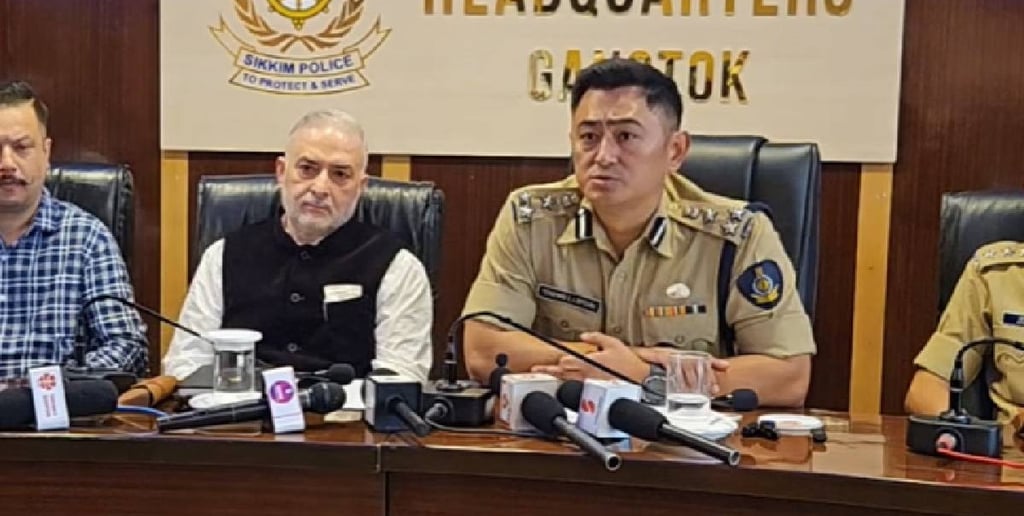Illegal online gambling is ruining families, just like drugs : DIG Tenzing Loden Lepcha
DIG Lepcha said that the authorities then shifted focus to monitoring the banking system. By following money trails and freezing accounts linked to gambling, the police were able to reduce the scale of operations.
LOCAL


The Directorate of Sikkim State Lotteries and the Sikkim Police held a joint press conference in Gangtok to raise alarm over the growing menace of illegal online gaming websites that are targeting people in the state and beyond. Senior police officials and lottery department officers spoke at length about the serious threat these websites pose to society and the steps being taken to curb them.
DIG of Gangtok Range, Tenzing Loden Lepcha said that a complaint had been filed in July by the Principal Director of the Directorate of Lotteries, Pawan Awasthy. Following this, a case was registered as Case No. 3 of 2025, with charges under organised crime, cheating, and specific provisions of the IT Act including Sections 66C and 66D for misuse of computer resources.
During the investigation, officials found that around 72 to 74 websites were running illegal gaming activities. These websites operated through intermediaries like Facebook, YouTube, and other hosting platforms. Some of the content uploaded was highly objectionable. DIG Lepcha explained how such domains are often registered abroad through companies like NameCheap or GoDaddy, and hosted on servers like Amazon Web Services, which makes direct enforcement difficult.
When users logged into these sites, they were asked to make banking transactions, depositing money in the hope of winning large sums in return. Police officers revealed that several bank accounts used for these transactions were traced and ₹32 crore was found frozen in one of them. Once these accounts were frozen, users began receiving alerts that these websites were not permitted in their regions.
As a result, over 90 websites were blocked, including popular ones such as “Khelo Bet,” “Khelo 24 Bet,” and “Khelo Match.” Despite this, the police found that new websites kept reappearing almost instantly under slightly changed names, making enforcement a continuous challenge. In fact, while 90 sites were blocked, around 900 new ones surfaced soon after.
DIG Lepcha said that the authorities then shifted focus to monitoring the banking system. By following money trails and freezing accounts linked to gambling, the police were able to reduce the scale of operations. Restrictions were also applied at the IP level in Sikkim and parts of Bengal, and GPS-based blocks were used to prevent access to betting applications in specific regions.
The police said that the impact of illegal gambling is not just financial but also social. “Families are being ruined, people are getting addicted. This addiction is no different from drugs,” said DIG Lepcha, comparing the lure of easy money to substance abuse. Victims have even been pulled into cryptocurrency-based scams and multi-level marketing schemes that promise high returns but eventually lead to huge losses.
One reported case revealed that four people had invested nearly ₹8–9 lakh each, with the total losses running into crores. Officials believe the real figure could be much higher as more victims come forward.
The press conference also highlighted that Sikkim has been proactive compared to other states in tackling the issue. The state government and police have already raised their concerns with the Ministry of Home Affairs, which acknowledged the seriousness of the matter and extended support. According to officials, Sikkim’s initiative has encouraged other states to look into similar cases.
Principal Director of State Lotteries, Pawan Awasthy, who was also present, said that the department’s main concern was to protect the people of Sikkim from financial exploitation. He noted that illegal gambling networks were operating not just in Sikkim but across India, and unless strict measures are taken, more families will fall into debt and distress.
The police assured that the investigation is ongoing. With the help of banking trails and KYC details, further action will be taken against those behind the racket. While blocking websites remains a challenge due to their rapid reappearance, freezing bank accounts linked to gambling money has shown results.
DIG Lepcha said: “Online gambling is becoming an addiction. Families are suffering. We are treating this as seriously as drug abuse, and we will continue to act strongly against it.”
